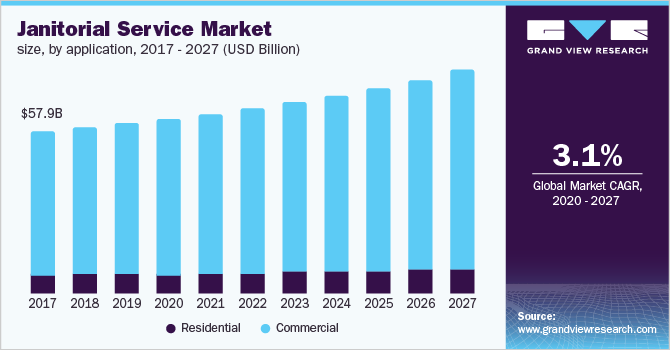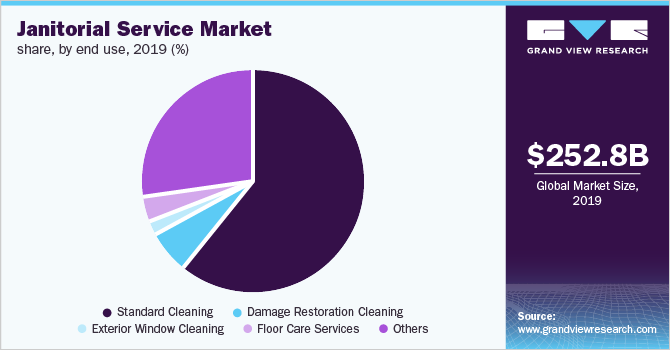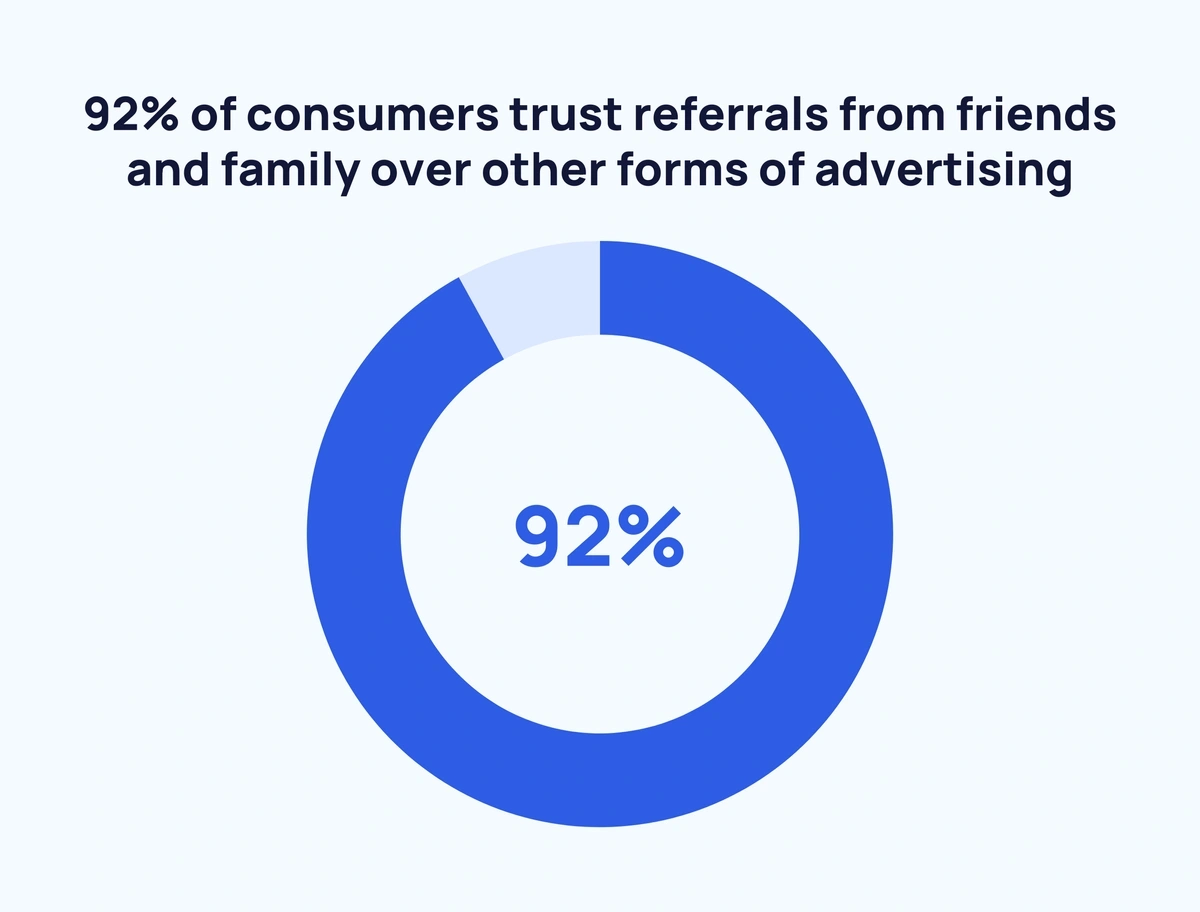The janitorial services industry in the United States is a $61 billion market as of 2022, according to an IBISWorld report on the cleaning industry. With over 814,000 businesses operating in this industry, there is ample room for new players to capture market share, especially local and regional operations.

Many small business owners and entrepreneurs are attracted to the relatively low barriers to entry in the janitorial services industry. Startup costs are minimal compared to other types of businesses, as the necessary equipment like cleaning supplies and tools are inexpensive. The ability to start small by self-performing the cleaning services also appeals to new entrepreneurs who want to minimize initial outlays.
This guide will walk you through how to start a janitorial business. Topics include registering an EIN, forming a legal business entity, marketing, building a brand, customer focus, obtaining business insurance, and more.
1. Conduct Janitorial Market Research
If you’re wondering how to start janitorial business market research you’re not alone. Market research comes in two forms, primary and secondary. Primary research is compiled by you and your team, while secondary research is information already available, or made available by a third party.

Some information you may learn through market research for your own cleaning business includes:
- With a majority of companies in the janitorial services industry being small local operations with less than ten employees, there is room in the market for ambitious solo entrepreneurs.
- The pandemic brought unique cleaning challenges and protocol changes, but COVID-19 did not negatively impact the industry overall.
- The residential cleaning segment saw strong consumer demand during 2020 and 2021 especially.
- Location plays a major role in the viability of new janitorial operations. Densely populated metropolitan areas often present the strongest customer base potential.
- The top five states by janitorial services revenue are California, Texas, New York, Florida then Illinois.
- Setting up shop in states with high concentrations of businesses provides the most revenue capture opportunities through consistent sales.
- While individual consumers are a factor too, the most lucrative janitorial customer niche tends to be structured B2B contracts.
- Hot prospect targets include office spaces, medical facilities, educational institutions, retail locations, and industrial warehouses.
- There is major revenue potential in securing just a handful of solid commercial cleaning accounts upfront. This can then fund scaling efforts to expand operations.
- Specialized cleaning is another component new janitorial businesses can focus on to stand out in their regional market.
- Offering disinfecting/sanitization services, floor stripping, window washing, pressure washing, and construction site cleanup are examples of niche services to generate strong margins.
- Specialization signals quality and care to potential customers.
- With perpetual facility maintenance demands the equipment market directly supports and enables the consistent success of professional janitorial services.
The enduring multi-billion dollar janitorial services industry has demonstrated resilient and increasing market demand. For the ambitious entrepreneur, starting a locally-based janitorial operation in a heavily populated metro area and securing a handful of commercial contracts is a proven path to secure substantial revenue within the first year.
On top of that, janitorial services are often provided as part of commercial cleaning services so if you manage to push into the market and make a name for yourself, chances are you may also get offers to expedite your services.
2. Analyze the Competition
Evaluating competitors is critical for any janitorial business, whether local brick-and-mortar or more digitally based. Learning about other cleaning businesses provides valuable information to build your business plan, including price guides, trends in products, and where to find the best cleaning jobs.

The best approach is assessing competitors holistically across these four key factors:
- Service Area & Customer Profile: Identify direct competitors based on geographic service reach and target customer markets. Analyze janitorial firms specializing in cleaning medical offices or industrial warehouses within a certain metro radius.
- Services & Offerings: Research service details like standard contracts, niche offerings, cleaning products/equipment, and add-ons like restocking/floor care. Compare pricing structures too.
- Online Presence & Reputation: Search for each competitor by name across Google, Facebook, Yelp, and other review sites. Evaluate their website content, claimed area served, before/after photo galleries, testimonials, and presence on bidding/booking platforms.
- Customer Engagement Hints: Competitor social media pages offer clues into how they engage, retain, and generate new accounts. Notice content themes/frequencies, special offers, and customer response rates.
By benchmarking rival janitorial services within the target region across these facets, new startups spot strategic gaps in competitor coverage, messaging, or service line limitations. Performing competitive analysis illuminates important details you’ll use as a business owner to build your own commercial cleaning business.
3. Costs to Start a Janitorial Business
When starting a janitorial services company, the initial costs consist of required equipment, establishing a legal business entity, and covering initial operating expenses during the crucial customer acquisition phase. For a solo or small operation targeting commercial clients, plan on $15,000 to $30,000 to launch properly.
Start-Up Costs
- Equipment & Supplies – $2,500 Commercial floor vacuums, backpacks, mop buckets, microfiber cloths, dusters, green cleaning chemicals, and restocking supplies like paper products, hand soap, and plastic liners. Shop used equipment to save costs initially.
- Incorporation Fees – $800 Forming a proper corporate entity like an LLC provides legal and tax advantages. Use a business formation service to cover state/local licensing and filing fees.
- Logo & Branding – $500 Invest in branding elements like logo design, uniform shirts, vehicle magnets, and other visual items that signal professionalism to prospective customers.
- Insurance – $1,200 per year General liability insurance protects the business in the event of property damage or bodily injuries while cleaning. Expect about $100 monthly.
- Website – $1500 A modern website that clearly explains services and allows online bookings is essential to competing for commercial contracts. Plan for a 5-page site with custom content.
Ongoing Costs
- Commercial Rent – $1000+ Many janitorial startups operate from home initially but should secure warehouse space as the business scales. Expect a minimum of $1,000 for an entry commercial unit.
- Labor Costs – Variable As contracts are won, hire employees or independent contractors to clean sites nightly. Labor totals are the biggest expense, averaging 50-80% of gross revenue.
- Software Fees – $100 Use cloud-based software to schedule cleaners efficiently. Options like Jobber and Housecall Pro optimize routes and track contract pricing/history.
- Vehicle Fuel & Maintenance – $300 Transporting cleaners and equipment to client sites rack up miles quickly. Set a fuel budget and fund periodic van/truck repairs.
- Admin, Sales & Marketing – 10+ Hours Monthly Expect long hours, especially at first, to actively bid jobs, cold call/email prospects and manage back-office tasks to launch successfully. Outsourcing tasks like bookkeeping can eliminate administrative headaches.
In the first year, hitting $100k in revenue is reasonable while capturing 5-10 solid commercial contracts consistently. After covering all labor and operating expenses, 30-40% of gross revenue may be retained as owner earnings in a lean startup model.
4. Form a Legal Business Entity
When establishing a legal business structure, janitorial service owners have four main options:
Sole Proprietorship
Simple and inexpensive to form, profits and losses flow directly to the business owner’s tax return. However, the owner has unlimited personal liability for debts, lawsuits, and claims. This exposes personal assets should legal issues arise from cleaning services rendered.
Partnership
A partnership splits ownership between two or more people, with profit/loss distribution as defined in the partnership agreement. The partners still have full personal liability, however. Disagreements between partners can also dissolve the entity entirely.
Limited Liability Company (LLC)
Forming an LLC provides legal and tax advantages tailored to service businesses like janitorial companies. LLC owners have limited personal liability protection similar to a corporation. Profits pass directly to the owner’s tax returns also, avoiding corporate double taxation.
Corporation
Establishing a corporation creates a distinct legal entity from the owners. It requires more administration but limits owner liability. However, corporations face double taxation on profits. Unless pursuing external investment to scale rapidly, an LLC matches needs better.
5. Register Your Business For Taxes
An Employer Identification Number (EIN) is essentially a social security number for a business entity. It uniquely identifies the legal business for federal and state tax-reporting purposes across employee payroll, licensing, and other transactional activities.
As soon as a janitorial service establishes any formal corporate structure like an LLC or corporation, applying for an EIN becomes legally required. The same mandate applies if bringing on any employees or paying independent contractors.
An EIN facilitates compliance when:
- Paying contractors
- Opening a business bank account
- Applying for business licenses/permits
- Remitting withholding taxes
The IRS offers free online EIN application to expedite number assignment:
Follow these steps:
- Identify the legal business name & structure matching formation documents
- Select the reason applying and the responsible party
- Verify the business’s physical location
- Provide owner name, SSN, and contact details
- Submit the online form and instantly receive the EIN
The entire approval process takes less than 15 minutes. With EIN established, register for applicable state/local taxes next using details like North American Industry Classification System business codes found on the completed IRS application.
EIN submission triggers requirements to collect and remit state sales tax along with federal/state payroll taxes. Fortunately, both registration processes are also straightforward starting points facilitated online.
6. Setup Your Accounting
For janitorial companies, accurately tracking numerous expense transactions and customer payments is critical yet challenging without the right financial systems in place. Investing in contract-centric accounting software and working with an accountant protects the business both legally and financially.
Automating with Software
Solutions like QuickBooks seamlessly synchronize business bank/credit card accounts to track income and expenses. Everything integrates into easy reporting on profitability, taxes due, and actionable metrics to scale smarter. The right software saves endless hours reconciling everything manually.
Hire an Accountant
While automation handles daily transactions, strategic financial guidance requires professionals. A bookkeeper can perform tasks like monthly close, collections, payables, and payroll smoothly so owners focus on sales and service delivery. Expect costs of $500 monthly for robust near real-time finance oversight.
Open a Business Bank Account
Keep business finances wholly separate from personal for simplified reporting, limiting liability, and qualifying for credit. Business-exclusive bank accounts and cards also build credit ability faster by reporting regular healthy account activity monthly.
Apply for a Business Credit Card
Apply for business credit cards requiring just an EIN and the owner’s social security number. Issuers like Capital One Spark or Chase Ink vet primarily based on owner credit scores. Initial smaller limits of $1-5k get unlocked to higher ceilings by consistently demonstrating on-time payments from the dedicated business account.
7. Obtain Licenses and Permits
When launching a professional cleaning business, proper licensing ensures full legal compliance across multiple facets of operations. Find federal license information through the U.S. Small Business Administration. The SBA also offers a local search tool for state and city requirements.
Business License Nearly all states require an overarching business license tied to formal corporate formation documents like LLC articles. Fees range from $50 to several hundred dollars annually. The business license officially recognizes the entity to transact commerce legally within state borders.
Fictitious Name Registration If electing to operate under a DBA (“doing business as”) name that differs from the technical legal name, register the alternate trade name. This fictitious name registration is completed through the county clerk typically for around $30 per name.
Occupational Licenses Several states mandate occupational licenses for individual service contractors across trades including cleaning work. These require taking an exam, background check, and paying $100+ in individual fees initially. Janitorial business owners themselves may need occupational licensing also depending on the staffing model.
Workers Compensation Legally mandated workers’ compensation insurance covers injuries, lost wages, and rehabilitation for W-2 employees. Premiums range from $27 per cleaner monthly up to $1500+ depending on payroll size. Failing to carry active workers comp constitutes fraud with civil and criminal implications.
Specialized Permitting Local permits for pressure washing, biohazard cleanup, and other environmental services may apply. Lead-based paint removal requires EPA certification. Identify any niche vertical permissions documenting full cradle-to-grave compliance. Having necessary permits on file is as important as the service capability itself when bidding contracts.
8. Get Business Insurance
Safeguarding a janitorial startup with comprehensive insurance coverage is non-negotiable. Policies shield the hard-built business from financial ruin should property damage, bodily injury, or other liabilities arising from daily operations.
Without coverage, just one incident could spell the end through crushing expenses and lawsuits. Consider if an employee accidentally started a fire in a client building. Or a cleaner slipped and seriously injured themselves on a wet floor. The business assets and owner’s finances would be fully exposed without policies guarding the company.
Janitorial business insurance starts with general liability protection at a minimum. Additional considered policies include:
- Errors & Omissions
- Commercial Auto
- Workers Compensation
- Umbrella Insurance
An insurance broker that specializes in cleaning services makes tailoring the optimal policy bundle easy. Expect to invest 5-20% of gross revenue into premiums for ample risk mitigation.
Apply for commercial policies providing detailed company information like:
- Entity formation docs
- EIN
- Owner identities
- Staff size
- Locations serviced
- Past liability claims
Insurers review these details across various proprietary criteria to quote different coverage options. Expect policy documentation in 5-7 business days once formally approving an option.
9. Create an Office Space
An office provides a professional home base for janitorial companies to meet clients, coordinate cleaners, and manage back-office tasks. The flexibility of mobile work complicates determining the right physical footprint. Weigh cost, growth plans, and client impressions when choosing space.
Home Office
Solo operators can save significantly by designating a spare bedroom or finished basement as a home office. Use the space for administrative work, storing supplies, and meeting rare clients. Deduct a portion of household expenses like utilities and internet on tax returns. Expect to outgrow residential workspace quickly as contract volume expands.
Coworking Space
As team size grows, coworking spaces like WeWork allow scaling operations with more professionalism. Gain a business mailing address, meeting rooms, front desk staff, faster internet speeds, and social community without facilities overhead. Such flexible terms easily fit janitorial businesses awaiting the revenue stability to commit to longer-term commercial leases. Expect to budget $300+ monthly for an office in a coworking space.
10. Source Your Equipment
Janitorial services rely on core equipment like vacuums, mops, carts, ladders, and chemicals to deliver contracted cleaning services. Strategically acquiring necessary gear at the lowest cost allows higher profit margins. Explore these four main sourcing strategies when equipping a cleaning operation:
Buy New
Purchasing brand-new commercial-grade equipment from specialty distributors like Janitorial Store, CleanFreak or American Vacuum Company provides full warranty coverage right when reliability matters most during launch. However, the premium prices often deter lean startups. Expect to budget $2000 for just basic floor care tools and accessories buying everything brand new.
Buy Used
Savvy small business owners scope local postings on Facebook Marketplace, Craigslist, and auction platforms like GovDeals for major discounts on quality used models. Advance $500-$1500 buying secondhand depending on tool conditions to get started. Just confirm operational functionality before purchasing as repair costs quickly diminish any perceived discount.
Rent Equipment
Renting tools monthly requires no upfront capital. National rental chains like United Rentals charge reasonable weekly/monthly rates. However, accumulating rental fees minimally for 2-3 years often offsets just owning equipment outright through creative sourcing methods. Short-term equipment needs or trials do warrant rental consideration.
Lease-to-Own
Lease-to-own equipment agreements mix the benefits of renting tools now with structured payments leading to full ownership over time. Companies like Financial Pacific Leasing offer attractive options. Just recognize total spending often exceeds just buying used equipment unless the lease terms and tax deductions meaningfully offset the true cost of usage.
11. Establish Your Brand Assets
Crafting a recognizable brand builds awareness and trust that wins new cleaning contracts. Ensure the business consistently communicates professionalism through these core brand pillars:
Getting a Business Phone Number
Acquire a dedicated business phone number from a leading VoIP provider like RingCentral. Choose a local area code and utilize call routing to ring cell phones seamlessly. Expect costs to start around $30 monthly.
Creating a Logo and Brand Assets
Logos visually encapsulates the brand for customers. Bold iconography like a sparkling building exterior conveys cleaning action. Combining this with a descriptive name like “Sparkle Building Services” boosts memorability. Use a logo maker like Looka to design variations on the vision affordably.
Business Cards and Signage
Business cards serve as handy leaves-behinds after in-person sales meetings and site walkthroughs. Additionally, yard signs or exterior building signage display credibility for service businesses. Order professional designs affordably from printers like Vistaprint.
Purchasing a Domain Name
Secure a matching.COM domain name for the brand during initial registration at domain sellers like Namecheap for under $15 annually. This facilitates building an engaging one-page website detailing service capabilities later on.
Building a Website
Leverage a DIY website builder like Wix to launch a modern, mobile-responsive website. You can also hire a freelancer through platforms like Fiverr. Focus content on commercial cleaning credentials, service guarantee, photo project galleries, and online contact forms to capture incoming leads 24/7.
12. Join Associations and Groups
Local Connections Bring Contracts For independent janitorial operators, networking within cleaning industry circles unlocks insider advice while forging fruitful partnerships over time. Get plugged into these three community channels:
Local Associations
Area-based professional groups are a great way to get to know like-minded individuals in the residential cleaning sector. Join the International Sanitary Supply Association or International Janitorial Cleaning Services Association to start. Attend association cleaning industry mixers to connect with other local service companies.
Meetups & Tradeshows
Sites like Meetup aggregate professional gatherings across categories and geographies. Search for regional cleaning business mixers and conference listings. Tradeshows also assemble vendors and service companies to demonstrate innovations and do deals. These recurring local events consistently deliver new relationships and referrals.
Facebook Groups
For 24/7 idea exchange, join targeted regional Facebook Groups like the Grow My Cleaning Company. Beyond geographic connections, broader national cleaning communities also share training materials and hard lessons learned. The Commercial Cleaning Company Community for example provides invaluable mentoring between thousands of engaging members.
13. How to Market a Janitorial Business
Marketing momentum attracts a steady stream of new commercial contracts. A multifaceted promotion strategy combining digital discovery channels with community networking sows organic brand visibility over time.

Tap Into Existing Contacts
Foundational marketing starts by tapping friends, family, and past employers to spread the word locally about the cleaning services available. Offer $100 referral bonuses to motivate happy customers to recommend the business within their office parks, HOAs, and other networks. These personal endorsements hold the most sway for credibility.
Digital Marketing Ideas
- Launch Google Ads campaigns to bid on regional janitorial and related keyword searches. Target service areas, highlight positive reviews, and offer booking incentives. Expect to budget $300-$500 monthly as accounts scale.
- Run Facebook and Instagram ads showcasing clean office spaces. Geo-target nearby zip codes and tailor messaging to business decision-makers. Allocate $100-$300 monthly testing various creatives and conversion tactics.
- Start a YouTube channel publishing commercial cleaning tips videos. Optimize titles for searchability. Embed calls-to-action to contact the business for local service pricing.
- Publish helpful blog content about sanitizing office spaces and link back to the business site as a commercial disinfecting authority.
Traditional Marketing Ideas
- Print full-color flyers and mailers detailing cleaning services and capabilities to distribute across nearby office parks and industrial areas monthly.
- Explore options for fixed banner or billboard signage placement along commuter routes and commercial zones to boost impressions.
- Inquire about underwriting segments on local radio stations to plug cleaning business. Expect partial barter arrangements needing some cash buy-in.
- Host Lunch ‘n Learns at local office spaces to share cleaning tips and offer attendees special package rates.
The most effective customer acquisition channels will reveal themselves over time through testing response rates across the various options. Maintain an experimental mentality while aggressively pursuing both digital and real-world campaigns. Marketing ROI optimization comes with repetition through an ever-growing contact list and community connections.
14. Focus on the Customer
For cleaning companies, delivering incredible service quality and responsiveness directly fuels customer loyalty, retention, and referrals. In an industry reliant on recurring contract revenue, service satisfaction serves as the most powerful marketing channel over time.
Consider a janitorial provider that thoroughly cleans offices nightly across a corporate campus. They take extra time inspecting restrooms, wiping down high-traffic areas other cleaners miss and consistently restocking disposables without needing reminders. Office managers notice the attention to detail.
The owner also ensures any feedback gets rapidly resolved. Special requests get notated for their skilled team to handle seamlessly night tonight. If any issues emerge, the owner inspects firsthand and immediately communicates improvements to the client.
This high-touch service approach earns immense goodwill with contracted customers. Satisfied accounts renew agreements for years while referring sister properties to utilize the conscientious provider as well.
The commercial cleaning realm fundamentally links income potential to consistent customer happiness. Cleaning contracts offer recurring revenue. Yet retaining and growing these retainer relationships relies entirely on ensuring clients receive maximum value from the services rendered. Top-notch service begets a thriving janitorial venture.
